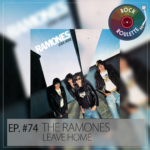
Episode 74 is here, the wheel has given us one of the godfathers of punk, The Ramones and their 1977 album Leave Home! Mark and Sav give their opinions on this seminal Punk Rock band and their music!
Leave Home is the second studio album by the American punk rock band Ramones. It was released on January 10, 1977. Songs on the album were written immediately after the band’s first album’s writing process, which demonstrated the band’s progression. The album had a higher production value than their debut Ramones and featured faster tempos. The front photo was taken by Moshe Brakha and the back cover, which would become the band’s logo, was designed by Arturo Vega. The album spawned three singles, but only one succeeded in charting. It was also promoted with several tour dates in the United States and Europe.
The songs in Leave Home concentrate on various themes, with the musical tones being diverse as well. Some tunes were more pop-oriented, while others, like “Gimme Gimme Shock Treatment” and “Pinhead” were loaded with distorted guitars and had a more punk rock sound. The song “Carbona Not Glue” was taken off the album because it potentially violated the trademark of the stain-removal product Carbona. The track was replaced with “Babysitter” in the United Kingdom and “Sheena Is a Punk Rocker” in the United States (prior to its inclusion on Rocket to Russia); both “Carbona” and “Babysitter” were included on the 2001 expanded edition.
Critical reception for the album was generally favorable, with several reviewers pointing out the fact that it highly resembled the band’s debut album. Critics also said the album was less groundbreaking than their debut but had humorous and enjoyable pieces. The album peaked at 148 on the Billboard 200 despite its critical acclaim as well as the band members expecting more commercial success.
The Ramones
Joey Ramone – lead and backing vocals
Johnny Ramone – guitar
Dee Dee Ramone – bass, backing vocals
Tommy Ramone – drums, additional guitar
Additional Musicians
Ed Stasium – additional guitar, Hammond organ on “Oh Oh I Love Her So”, backing vocals
Tony Bongiovi – percussion
Production
Tony Bongiovi – producer
Tommy Ramone – producer (credited as T. Erdelyi), mixing
Ed Stasium – engineer, mixing
Bob Clearmountain – engineer
Ray Janos – mastering
Additional Personnel
Moshe Brakha – front cover photography
John Gillespie – art direction
Pat Chiono – design
Arturo Vega – back cover art
Intro Music/Wheel Spin Music by LiteSaturation from Pixabay

Fair Use
* Copyright Disclaimer Under Section 107 of the Copyright Act 1976, allowance is made for "fair use" for purposes such as criticism, comment, news reporting, teaching, scholarship, and research. Fair use is a use permitted by copyright statute that might otherwise be infringing. Non-profit, educational, or personal use tips the balance in favor of fair use. No copyright infringement intended. ALL RIGHTS BELONG TO THEIR RESPECTIVE OWNERS
This is our musical reaction, breakdown, and commentary analysis of the song. We intend no copyright infringement, and this is not a replacement for listening to the artist's music. The content made available through this site is for educational and informational purposes only.
The site may contain copyrighted material owned by a third party, the use of which has not always been specifically authorized by the copyright owner. Notwithstanding a copyright owner’s rights under the Copyright Act, Section 107 of the Copyright Act allows limited use of copyrighted material without requiring permission from the rights holders, for purposes such as education, criticism, comment, news reporting, teaching, scholarship, and research. These so-called “fair uses” are permitted even if the use of the work would otherwise be infringing. *





